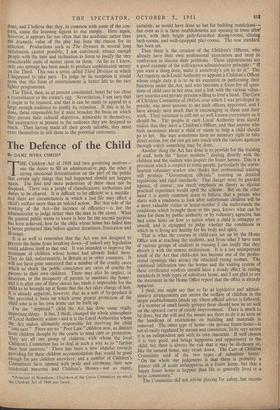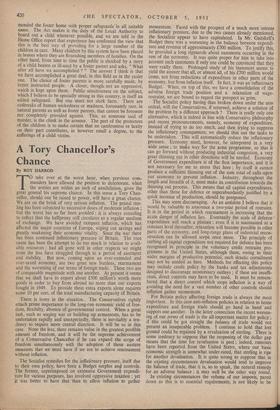The Defence of the Child
By DAMEMYRA CURTIS* It is as well to remember that the Act was not designed to prevent the home from breaking down—if indeed any legislation could address itself to that end. It was intended to improve the treatment of children whose homes had already failed them. They do fail, unfortunately, in Britain as in other countries. It Will not have gone unnoticed that a number of the cruelty cases Which so shock the public conscience are cases of cruelty by Parents to their own children. There may also be neglect, or desertion, or the incapacity of parents to maintain the home: and it is after one of these causes has made it impossible for the child to be brought up at home that the Act takes charge of him. It is already apparent, however, that as a sort of by-product it has provided a basis on which some greater protection of the Child who is in his own home can be built up.
For the " deprived " child the Act, has done some vitally ltnportan4 things. It has, I think, changed the whole atmosphere of Local Authority action—and it is the Local Authorities whom the Act makes ultimately responsible for receiving the child "into care." There are no " Poor Law "children now, as distinct from children thought by the courts to need care or protection. They are all one group of children, with whom the local Children's Committee has to deal in such a way as to "further their best interests." There has been a new impulse towards Providing for these children accommodation that would be good enough for any children anywhere, and a number of Children's Committees have opened with pride and ceremony their new residential nurseries and Children's Homes—not so many, ,
*Principal of Newnham ; Chairman of the Curtis Committee on which the Children Act of 1948 was based 1
certainly, as would have done so but for building restrictions— but even as it is these establishments are opening in town aft/ad' town, with their bright gaily-furnished dining-rooms, shining bath-rooms, and well-equipped play-rooms. The new standard has been set.
Then there is the creation of the Children's Officers, who already have their own professional association and meet in conference to discuss their problems. These appointments are a good example of the well-known administrative principle: "If you want a thing done, make it somebody's job to do it." The Act requires each Local Authority to appoint a Children's Officer whose single duty it is to be its executive in performing their functions under the Act, and who becomes a focus for all ques- tions of child care in her area, and a link with the various volun- tary societies and private persons willing to lend a hand. The Care of Children Committee of 1945-6, over which I was privileged to preside, was most anxious to see such officers appointed, and I have already seen much that is encouraging in them and their work. Their existence is still not so well known everywhere as it should be. The people in each Local Authority area should realise that they have a Children's Officer, and that anyone who feels uneasiness about a child or wants to help a child should go to her. She may sometimes have no statutory right to take direct action, but she can get into touch with the various agencies through which something may be done.
Another thing the Act has done is to provide for the training of staff: both the "house mothers" dealing directly with the children and the visitors who inspect the foster homes. This is a provision which is suspect to some people, particularly the warm- hearted voluntary worker who thinks that professional training will produce "Government officials" insisting on detailed regulations and rigid standards. That danger must be guarded against, of course ; too much emphasis on theory as -against practical experience would spoil the scheme. But on the other hand it is surely common sense to believe that a person who starts with a readiness to look after unfortunate children will be a more valuable visitor or house-mother if she understands the conditions which brought them to this pass, knows what can be done for them by public authority or by voluntary agencies, has had some hints on how to notice when a child is unhappy or unwell, and is equipped to judge whether the conditions in which he is living are healthy for his body and spirit.
That is what the courses in child-care set up by the Home Office aim at teaching the students, and from what I have seen of various groups of students in training I can testify that they absorb it with the utmost enthusiasm. It is a not unimportant result of the Act that child-care has become one of the profes- sional openings that attract the educated young woman. The continual infiltration into the homes and the visiting system of these certificated workers should have a steady effect in raising standards in both types of substitute home, and I am glad to see the statement in the Home Office report that the effect is already apparent. I think one might say that so far as legislative and admini- strative arrangements can ,secure the welfare of children in the larger establishments (made up, where official advice is followed. of a number of small family groups) these should now be set well on the upward curve of steady improvement. There is much to be done, but the will and the means are there to do it as soon as' the handicap of restrictions on building and materials is removed. The other type of home—the private foster-home—is not so easily regulated by statute and committee. In its very nature it is an independent unit with its own character. If well chosen it is very good, and brings happiness and opportunity to the child, but there is always the risk that it may be ill-chosen or. .like the natural home, may break down. The Care of Children Committee said of the two types of substitute home: "On the whole our judgement is that there is probably a greater risk of acute unhappiness in a foster home, but that a happy foster home is happier than life as generally lived in a large community." The Committee did not advise playing' forsafety, but mem- mended the foster home with proper safeguards in all suitable cases. The Act makes it the duty of the Local Authority to board out a child whenever possible, and we are told in the Home Office report that experience has confirmed the view that this is the best way of providing for a large number of the children in care. Many children by this system have been placed in homes where they are flourishing members of families. On the other hand, from time to time the public is shocked by a story of a child beaten or ill-used by a foster parent and asks, "What after all have we accomplished ? " The answer I think is that we have accomplished a great deal, in this field as in the easier one. The choice of foster parents is more carefully made, by better instructed people. A closer, though. not an oppressive, watch is kept upon them. Public sensitiveness on the subject, which I believe to be specially strong in this country, is itself an added safeguard. But one must not shirk facts. There are outbreaks of human wickedness or madness, fortunately rare, in natural parents as well as foster parents, that cannot be foreseen nor completely provided against. This, as someone said of murder, is the chink in the armour. The part of the protectors of the children is to make certain that no carelessness or laxity on their part contributes, in however small a degree, to the sufferings of a child victim.






















































 Previous page
Previous page